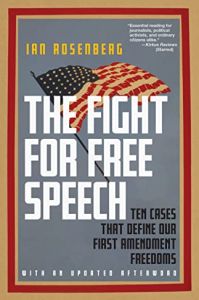Join getAbstract to access the summary!

Join getAbstract to access the summary!
Ian Rosenberg
The Fight for Free Speech
Ten Cases That Define Our First Amendment Freedoms
NYU Press, 2023
What's inside?
A compelling introduction to the principles and precedents defining free speech in America
Recommendation
Media lawyer Ian Rosenberg offers a timely exploration of the legal history of free speech in the United States. Through the stories of 10 Supreme Court cases, Rosenberg illuminates the evolution of Americans’ First Amendment rights to speak, write, protest, criticize, satirize, offend and even remain silent. In engaging prose that is free of legal jargon, Rosenberg captures the drama of these cases and the intense emotions that often played out alongside the legal proceedings. Carefully researched, humane and relevant, Rosenberg’s account brings valuable clarity to a subject of vital importance.
Summary
About the Author
Ian Rosenberg is a media lawyer and professor who provides ABC News clients with pre-broadcast counsel on issues such as libel, intellectual property rights, FCC regulations and more.
















Comment on this summary